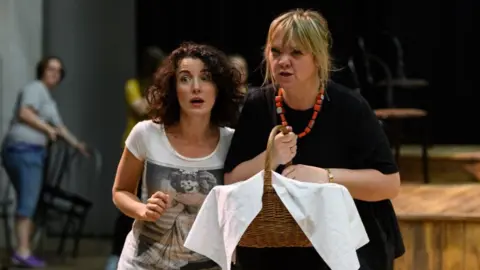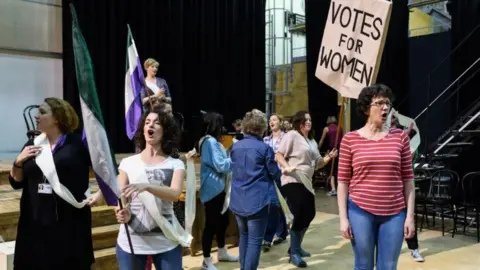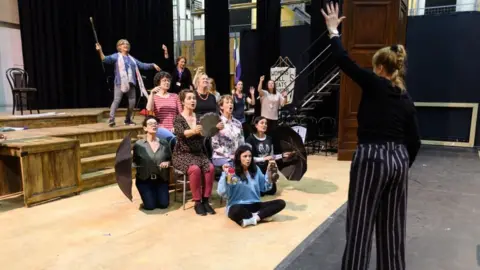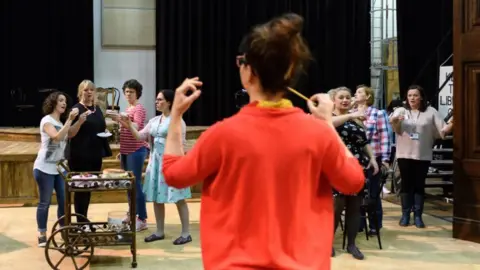Welsh National Opera: Life of Lady Rhondda hits the stage
 Jane Hobson
Jane HobsonShe was one of the key players of the suffrage movement, campaigning for women to sit in the House of Lords, embarking on a hunger strike in jail, as well as sitting as director on countless company boards.
Yet the achievements of Margaret Haig Thomas, otherwise known as Lady Rhondda, havye been largely airbrushed from history.
All that marks her four decades of campaigning is a small blue plaque in Risca Road, Newport, close to the postbox she tried to blow up in 1913, and a long-awaited portrait of her in Parliament.
Now though, Welsh National Opera is seeking to make her centre stage, touring a comedy opera about her life.
Boasting an all-female team, Rhondda Rips It Up! was commissioned to mark the centenary of some women getting the vote, and details Lady Rhondda's achievements within the suffrage movement.
Mezzo-soprano Madeleine Shaw, who plays the title role, said: "Lady Rhondda was instrumental in the fight for women's equality and performing this opera now couldn't be more relevant.
"Hopefully, as we travel around the country, it will ignite what women are fighting for today."
 Jane Hobson
Jane HobsonBorn in 1883, Lady Rhondda was the daughter of Liberal politician and businessman Viscount David Thomas.
Brought up as an only child and a feminist, she became secretary of the Newport branch of Emmeline Pankhurst's Women's Social and Political Union, leading the campaign for women's suffrage across south Wales and taking the cause to many hostile meetings.
She also took part in protest marches with the Pankhursts and attempted to destroy a postbox with a chemical bomb.
It was this act - and refusal to pay the fine - that landed her in Usk jail, Monmouthshire, a sentence from which she was only released after going on hunger strike.
She then launched the feminist weekly magazine, Time and Tide, with contributors including Virginia Woolf and CS Lewis.
Further drama ensued in 1915 when, after travelling to America with her father to help arrange munitions supplies for the British Armed Forces, her return ocean liner, the RMS Lusitania, was hit by a German torpedo and sank.
 Jane Hobson
Jane Hobson Along with her father, she clung to a wooden board and survived.
She then continued her business interests - becoming director of 33 companies throughout her life, the majority in coal, steel and shipping, and founding the Efficiency Club, a networking organisation for British businesswomen.
After her father's death in 1918, she inherited his title but was not allowed to sit in the House of Lords - a ban she voraciously campaigned against.
She died in 1958 - a few months shy of the first women taking their seat.
Her private life was as equally revolutionary.
In 1922, she divorced her husband Sir Humphrey Mackworth before having several relationships with women.
Yet despite her achievements and struggle for emancipation and equality, Rhondda Rips It Up! is far from a serious opera.
Performed in a classic Edwardian music-hall style, it is a tongue-in-cheek cabaret, with original songs inspired by the suffragette slogans.
 Jane Hobson
Jane HobsonIt also features prominent male politicians of the time - Winston Churchill, Herbert Henry Asquith and David Lloyd George - who are all played by women.
The librettist Emma Jenkins said: "It's slapstick but word comedy too. All the words rhyme.
"Big influences for it were Jeeves and Wooster by PG Wodehouse, plus Gilbert and Sullivan and, dare I say it, the Carry On films.
"Right at the start, we decided to do it as a comedy. There is a lot of comedy to be found in the world of provincial suffrage."
Explaining how she wrote the score, composer Elena Langer said: "I was initially finding it difficult, then I read a scene about food.
"It describes how all the posh suffragettes came to Lady Rhondda's house and her husband arranges for lots of teatime treats - pudding and souffle and all kinds of things.
"The suffragettes know they should support their sisters in prison (on hunger strike), but they see all these little things and they cannot resist it so they stuff their faces.
"The souffle - it's small and light. It immediately gave me tunes and textures."
The show will premiere in Lady Rhondda's hometown of Newport on Thursday before touring Wales and England.
It will be accompanied by a programme of community and youth projects on protest, rebellion and human rights.
As well as this opera about her life, Lady Rhondda is on the long-list of influential Welsh women, one of whom will be immortalised in a statue in Cardiff's Central Square in 2020.
